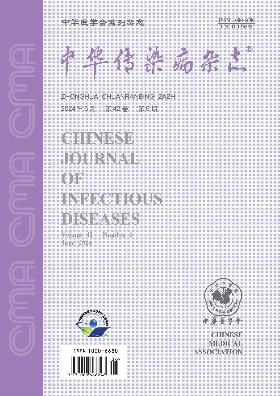The characteristics of cranial magnetic resonance imaging in adult Japanese encephalitis
引用次数: 0
Abstract
Objective To analyze the magnetic resonance imaging (MRI) images of patients with adult Japanese encephalitis (JE), and to investigate the diagnostic value of MRI for the disease. Methods Thirty-two adult JE patients who underwent cranial MRI at General Hospital of Ningxia Medical University between August 2016 and September 2018 were enrolled. All patients had disease onset between August and September and they aged 17 to 83 years old. The clinical data, laboratory results, MRI signal characteristics of each scanning sequence and the distribution of the brain lesions were retrospectively analyzed. Results Of the 32 adult JE patients, 29 (90.6%) cases had acute onset, 28 (87.5%) cases had unconsciousness and cognitive impairment, 26 (81.2%) cases had intracranial hypertension, 3 (9.4%) cases had meningeal irritation, 3 (9.4%) cases had Parkinson-like symptoms, 10 (31.2%) cases had epilepsy, and 15 (46.9%) cases had decreased muscle strength. Twenty patients were positive for JE virus-specific IgM antibodies. Twenty-eight patients underwent cerebrospinal fluid examination, 15 (53.6%) cases showed intracranial pressure ≥180 mmH2O (1 mmH2O=0.009 8 kPa), 7 (25%) cases developed lymphocyte reaction, and 16 (57.1%) cases showed mixed cell reaction. Twenty-three cases (71.9%) showed lesions of brain on MRI, including thalamus (17 cases, 73.9%), hippocampus (13 cases, 56.5%), cerebral peduncle (6 cases, 26.1%), cortical and subcortical (4 cases, 17.4%), basal ganglia (2 cases, 8.7%), brainstem (1 case, 4.3%) and splenium of corpus callosum (1 case, 4.3%). Positive T1 weight image (T1WI) and T2 weight image (T2WI) results were found in 21 patients, respectively, 23 patients had positive T2-fluid attenuated inversion recovery (FLAIR) images, and 20 patients had positive diffusion weighted imaging (DWI) images. Among them, T2-FLAIR and DWI images showed more lesions, wider range of lesions and clearer boundary of cortical involvement range than T1WI and T2WI images. Conclusions Bilateral thalamus and hippocampus are often involved in adult JE. T2-FLAIR and DWI sequences are more sensitive to detect lesions. Combining MRI images with epidemiological characteristics, clinical manifestations, and laboratory tests is of great assistance for early diagnosis of JE. Key words: Encephalitis, Japanese; Adult; Magnetic resonance imaging; MRI spectrum; Clinical spectrum成人日本脑炎的脑磁共振成像特征
目的分析成人乙脑患者的磁共振成像(MRI)图像,探讨MRI对该病的诊断价值。方法选择2016年8月至2018年9月在宁夏医科大学总医院接受头颅MRI检查的32例成年乙脑患者。所有患者在8月至9月期间发病,年龄在17岁至83岁之间。回顾性分析了临床资料、实验室结果、各扫描序列的MRI信号特征和脑损伤的分布。结果32例成人乙脑患者中,急性发作29例(90.6%),意识障碍28例(87.5%),颅内高压26例(81.2%),脑膜刺激3例(9.4%),帕金森样症状3例(9.4%),癫痫10例(31.2%),肌力下降15例(46.9%)。20例乙脑病毒特异性IgM抗体阳性。28例患者接受了脑脊液检查,15例(53.6%)颅内压≥180mmH2O(1mmH2O=0.0098kPa),7例(25%)出现淋巴细胞反应,16例(57.1%)出现混合细胞反应。23例(71.9%)在MRI上显示大脑病变,包括丘脑(17例,73.9%)、海马(13例,56.5%)、脑蒂(6例,26.1%)、皮质和皮质下(4例,17.4%)、基底节(2例,8.7%)、,脑干(1例,4.3%)和胼胝体压部(1例(4.3%)。分别有21例患者的T1加权图像(T1WI)和T2加权图像(T2WI)结果呈阳性,23例患者的T2液体衰减倒置恢复(FLAIR)图像呈阳性,20例患者的弥散加权图像(DWI)呈阳性。其中,T2-FLAIR和DWI图像比T1WI和T2WI图像显示更多的病变,病变范围更广,皮质受累范围边界更清晰。结论成人乙脑多累及双侧丘脑和海马,T2-FLAIR和DWI序列对病变的检测更为敏感。将MRI图像与流行病学特征、临床表现和实验室检查相结合,对早期诊断乙脑有很大帮助;成人;磁共振成像;核磁共振波谱;临床频谱
本文章由计算机程序翻译,如有差异,请以英文原文为准。
求助全文
约1分钟内获得全文
求助全文
来源期刊
自引率
0.00%
发文量
5280
期刊介绍:
The Chinese Journal of Infectious Diseases was founded in February 1983. It is an academic journal on infectious diseases supervised by the China Association for Science and Technology, sponsored by the Chinese Medical Association, and hosted by the Shanghai Medical Association. The journal targets infectious disease physicians as its main readers, taking into account physicians of other interdisciplinary disciplines, and timely reports on leading scientific research results and clinical diagnosis and treatment experience in the field of infectious diseases, as well as basic theoretical research that has a guiding role in the clinical practice of infectious diseases and is closely integrated with the actual clinical practice of infectious diseases. Columns include reviews (including editor-in-chief reviews), expert lectures, consensus and guidelines (including interpretations), monographs, short monographs, academic debates, epidemic news, international dynamics, case reports, reviews, lectures, meeting minutes, etc.

 求助内容:
求助内容: 应助结果提醒方式:
应助结果提醒方式:


